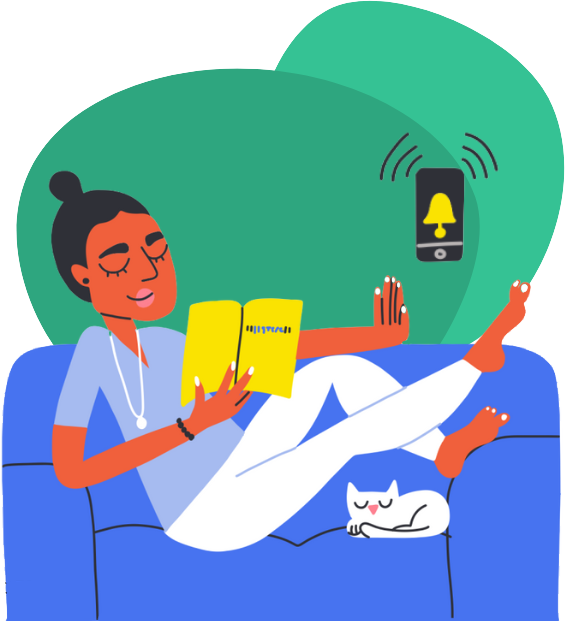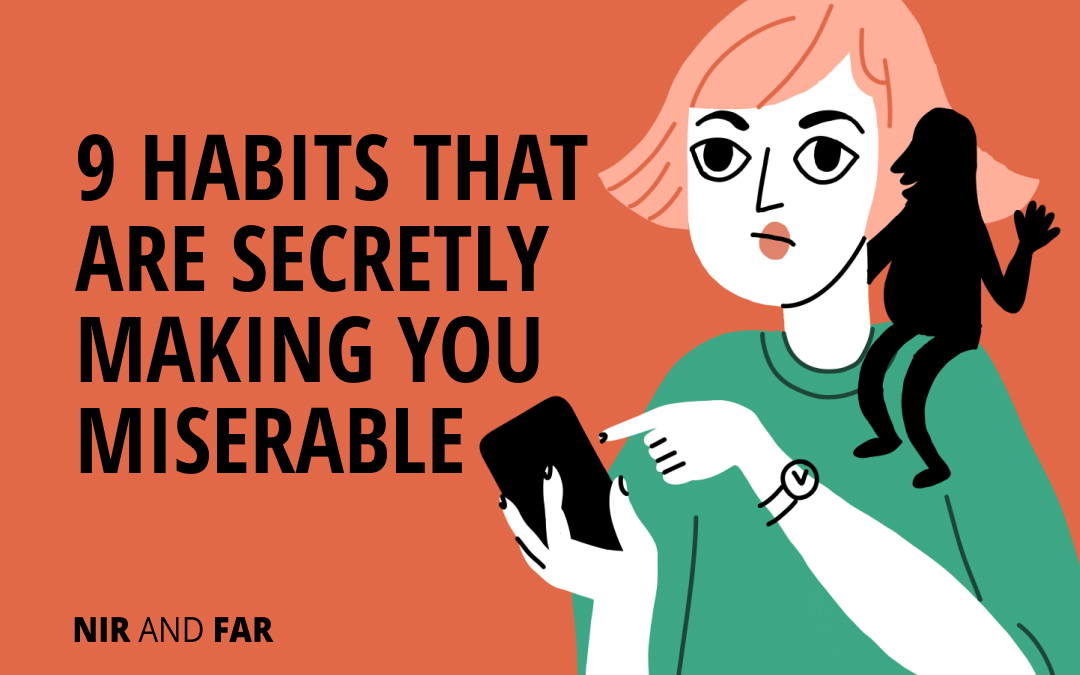Uncover the real sources behind habits secretly causing misery and learn simple ways to overcome them for a happier life. In this article, we’ll explore nine habits that might be secretly making you feel miserable and provide actionable strategies to break free from them. By addressing these habits, you can significantly improve your overall well-being and start living the life you deserve.
You wake up in the morning irritable and groggy but determined to be productive. Yesterday didn’t go well.
It always seems as if there are not enough hours in the day. You didn’t complete even the one big priority project that would have taken just a couple of hours if you’d focused. Still, you spent all day on the computer, even leaving your partner to handle dinnertime alone and canceling pickleball with friends.
And for what? Guiltily, you remember checking your phone each time you started to work on that big project. Scrolling through LinkedIn, you saw a post from a former coworker whose career has taken off in a way that yours hasn’t—probably because you can’t even finish the task in front of you.
To make up for the time you frittered away, you worked late into the evening without much to show for it. When you finally went to bed—feeling guilty about your procrastination, stressed that tomorrow would be challenging, worried you just might be a wage slave, and annoyed that you made things harder on yourself—sleep didn’t come for at least an hour.
Does this sound painfully familiar to you?
Many people experience days similar to this one because of these habits that secretly make us miserable. But they don’t have to.
Let’s dive into the specific habits and learn how to stop being miserable.
1. Constantly Checking Your Phone>
Our phones are always with us, ready to offer a distraction to escape the pain of doing whatever we don’t want to do.
The constant notifications and urge to check our phones disrupt our focus, drawing out the time needed to finish a task to an excruciating number of hours. We then feel dissatisfied and miserable that we gave in to distraction and didn’t do what we were supposed to.
The Social Dilemma documentary would have us believe that our phones and the social media apps on them are hijacking our brains. But humans aren’t robots wired to obey every suggestion. We have the power to control what we give our attention to.
Hack back your phone distractions so those external triggers don’t prompt you to pick up your phone. When you feel tempted to peek at your phone, close your eyes and take a breath to surf the urge. Tell yourself that you can check your phone in 10 minutes if you still want to.
2. Procrastination
Putting things off until the last minute increases stress and makes us discontent with ourselves. Yet people procrastinate because they don’t want to deal with the discomfort they associate with doing the project, such as anxiety, uncertainty, or boredom.
Time and again, I’ve heard people label themselves as hopeless “procrastinators.” But procrastination is not an inherent human trait. It’s an emotion-regulation problem. The vast majority of us can learn to regulate our emotions better.
When you feel an internal trigger like anxiety, uncertainty, or boredom, try this: identify what you are feeling and write it down, then explore the emotion with curiosity rather than contempt. Don’t shut out the feeling; by deliberately avoiding specific thoughts, they become more persistent, a phenomenon called ironic processing.
You can also use timeboxing to schedule your daily tasks in a calendar, which is a far more effective time management technique than a to-do list. When your agenda shows it’s time to tackle a task, it’s important that you follow through.
You will feel better for focusing on and completing the task rather than extending the discomfort of not doing it! Understanding the concept of traction vs. distraction can further help you differentiate between activities that move you towards your goals and those that pull you away from them.
3. Comparing Yourself to Others
We’ve all experienced envy and inadequacy by comparing ourselves to others. Feeling jealousy when watching highlight reels of others’ lives on social media can exacerbate our FOMO, the fear of missing out.
FOMO is an internal trigger that can drive us to distraction. Feeling that someone else is having a better time or leading a more exciting life can keep us from appreciating what we have and working towards improving ourselves.
It can also make us strive for things others want, like fancy possessions. That kind of motivation is extrinsic—it relies upon factors outside ourselves—and it’s not always the best motivator. Conspicuous consumption makes us feel good for a while, but that feeling always fades. Extrinsic motivation may even influence us to pursue jobs or goals we don’t actually want.
To combat this, it’s crucial to focus on your own journey and progress. Remember, everyone has a different path, and comparing yourself to others can be detrimental. Instead, concentrate on your list of personal values and goals to understand how to stop being miserable in the long run.
4. Focusing on the Negatives
Humans have a propensity for focusing on the negative.
If you’re stuck in a cycle of negative thinking and wondering, “Why do I feel miserable all the time?”, it’s important to understand the human propensity for focusing on the negative.
We have a negativity bias, “a phenomenon in which negative events are more salient and demand attention more powerfully than neutral or positive events,” and we ruminate over bad experiences.
These two psychological factors help us learn from past experiences. Still, on the flip side, dwelling on negative thoughts and experiences can lead to a negative mindset.
For example, if you have a day of low productivity, the least productive thing you can do to recover is shame yourself—it’s a mental trap. The shame will only drive you to distraction, perpetuating a vicious cycle.
Practicing introspection to reach self-awareness is a powerful tool for dealing with negative thoughts. Introspection accesses your thoughts and feelings, self-reflection lets you process them, and the resulting insights can be acted upon.
By becoming self-aware, you boost your ability to control your emotions. That not only helps you fight distraction but also reduces stress and anxiety and fosters a greater sense of well-being.
5. Not Setting Boundaries
Failing to set boundaries with work, friends, and family can lead to burnout and a depletion of energy, creativity, and motivation.
Think of your life in three domains: you, your work, and your relationships. Within each life domain are the values or attributes of the person you want to be.
All life domains should get space in your calendar; if they don’t, you’ll feel unbalanced and out of whack because failing to live in line with our values disrupts the trajectory of our lives.
Once you’ve identified your values—and don’t lie to yourself—you can turn them into time by timeboxing the activities that fulfill them.
A timeboxed calendar visualizes your days and forces you to be realistic about how much time you have. It compels you to make decisions and implement boundaries. For example, every Saturday morning is reserved for your family, and work-related tasks only occur between 7 am and 6 pm Monday through Friday.
Free Distraction Tracker
Reclaim control of your attention today.
Your email address is safe. I don't do the spam thing. Unsubscribe anytime. Privacy Policy.

6. Surrounding Yourself with Distracted People
Who you spend time with has a significant impact on your behavior and focus. If you surround yourself with people who are constantly distracted, their habits will likely influence you. This phenomenon, known as “social contagion,” can make it difficult to maintain your focus and discipline.
Instead, seek out and spend time with people who share your values of focus and productivity tips. By surrounding yourself with like-minded individuals, you reinforce your own commitment to becoming indistractable. These social antibodies help create an environment where staying focused is the norm rather than the exception.
7. Neglecting Self-Care
Failing to take care of our physical and mental health leads to feelings of exhaustion and unhappiness, also known as burnout.
Yet taking care of yourself is at the core of the three life domains because the other two depend on your health and wellness. If you’re not taking care of yourself, your relationships suffer, and your work isn’t its best.
Exercising, sleeping, eating healthy meals, and spending time on a hobby, like reading, knitting, or gardening, are all ways to invest in ourselves.
8. Lack of Self-Compassion
A significant source of misery is how harshly we judge ourselves. Many people fall into the trap of toxic self-criticism, which only perpetuates feelings of inadequacy and stress. Instead, practice self-compassion. Talk to yourself the way you would talk to a friend who is struggling.
By treating yourself with kindness and understanding, you can break the vicious cycle of self-blame and cultivate a more positive, supportive internal dialogue.
9. Failing to Schedule Time for Distractions
One reason you might wonder, “Why do I feel miserable all the time,” is that you don’t schedule time for distractions. An essential part of becoming indistractable is understanding that not all distractions are bad. In fact, making time for distractions can help you manage them better. When you schedule time for the things you enjoy, you prevent them from encroaching on your productive hours. Remember, the time you plan to waste is not wasted time.
Set aside specific periods for activities like scrolling through social media, watching TV, or playing games. By allocating time for these activities, you can indulge in them guilt-free and ensure they don’t interfere with your important tasks.
Transform Your Habits to Transform Your Life
By identifying and managing these habits, you can learn how to stop being miserable and lead a happier, more fulfilling life. Here’s more advice on how to kick those irritating habits to the curb.
Related Articles
- Schedule Maker: a Google Sheet to Plan Your Week
- Habit Tracker Template in Google Sheets
- The Ultimate Core Values List: Your Guide to Personal Growth
- Timeboxing: Why It Works and How to Get Started in 2025
- An Illustrated Guide to the 4 Types of Liars
- Hyperbolic Discounting: Why You Make Terrible Life Choices
- Happiness Hack: This One Ritual Made Me Much Happier

